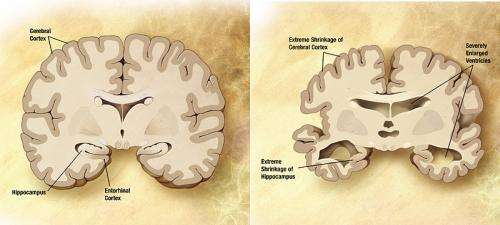Blood-based marker for Alzheimer's disease shows diagnostic potential

Researchers in Japan and Australia have used the ratio of different forms of the hallmark Alzheimer's protein, amyloid, in blood to detect those who have high levels of the protein in their brain. Their findings are published today in the scientific publication Nature and take researchers a step closer to developing a blood test for the Alzheimer's protein.
The amyloid protein is known to build up in the brain during Alzheimer's, creating clumps of protein known as plaques. Previous research has shown that people with Alzheimer's disease also tend to have more amyloid in their blood and spinal fluid than healthy people. However, these markers are not yet accurate enough to be used successfully as a tool when diagnosing Alzheimer's in the clinic.
There are several different forms of the amyloid protein, some more sticky and harmful than others. This new study presents an approach to measure specific forms of amyloid protein in the blood, suggesting a potential new technique to help diagnose the disease. Scientists measured the ratios of different forms of blood amyloid and compared the findings to amyloid levels in the brain using multiple PET scans.
The researchers studied two different groups of people, one from Japan and another from Australia to help confirm their results. Researchers found that a measurement that included multiple ratios of blood amyloid type could improve how well they were able to predict the amount of amyloid in the brain on brain scans.
Dr. Carol Routledge, Director of Research at Alzheimer's Research UK, said:
"We know that damaging changes begin to take place in the brain many years before the symptoms of Alzheimer's appear, and researchers are now developing new ways to detect the earliest signs of the disease. Searching for reliable markers of disease in blood is a tricky task, as protein levels can be influenced by so many factors that differ between individuals.
"This robust study finds the ratio of slightly different forms of amyloid in the blood ties in well with signs of Alzheimer's disease on brain scans, a useful step in validating its potential as a diagnostic tool. The study uses data from two countries, which helps overcome differences found in people across locations that is a common problem in blood biomarker studies, and its accuracy in predicting amyloid in the brain is higher than other previous attempts. Given the risk of false positives or negatives from tests like this, further work with more people will need to build on this study to understand how well this approach could predict those who will go on to develop symptoms of Alzheimer's in the future.
"A blood marker for Alzheimer's could prove valuable as a minimally invasive and cost-effective addition to the current diagnostic tests available for the disease. The ability to detect the very earliest stages of Alzheimer's would not only allow people to receive existing treatments sooner but would also enable new drugs to be trialled in the right people, at the right time."



















